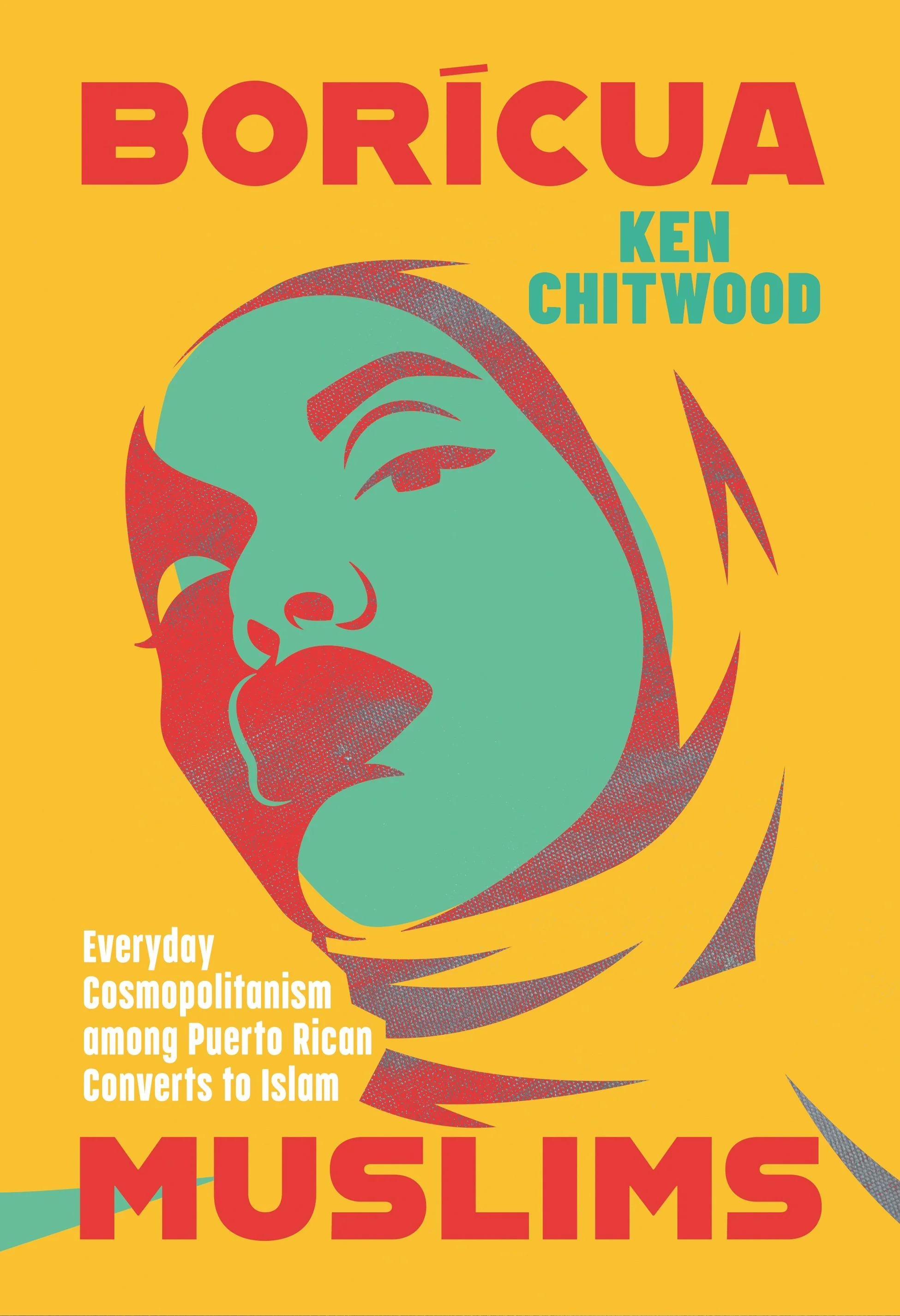Borícua Muslims: Everyday Cosmopolitanism Among Puerto Rican Converts to Islam
“Borícua Muslims is a timely and groundbreaking study of Latinx Islamidad and the growing number of Puerto Rican Muslims in the Caribbean and the United States. Ken Chitwood brings his multilingual talents in cultural studies, ethnography, and journalism to bear in this expansive and joyful exploration of how AmeRícan Muslims negotiate their island lives, transnational migrant encounters, and cosmopolitan community belongings in the global Muslim ummah.”
— Aliyah Khan, University of Michigan, Ann Arbor, author of Far from Mecca: Globalizing the Muslim Caribbean
“This expansive and powerful book sheds light on the everyday lives of AmeRícan Muslims by tracing their experiences, border crossings, and identities from Newark to Bayamón to Houston. Borícua Muslims is intellectually rich, well written, and full of incredible stories that offer a compelling look at the varied and complex intersections of American religion, global Islamic studies, and Latinx Muslims.”
— Felipe Hinojosa, Baylor University, co-editor of Faith and Power: Latino Religious Politics Since 1945
“…an ethnographically rich and theoretically sophisticated introduction to a relatively understudied population…Borícua Muslims gives us an opportunity to think about what it means to belong to multiple heritages and communities, especially those whose coexistence has been continually denied.”
— Melanie Rae Perez, International Journal of Latin American Religions
Among Puerto Rican converts to Islam, marginalization is a fact of daily life. Their “authenticity” is questioned by other Muslims and by fellow Borícua on the island and in the United States. At the same time, they exist under the shadow of US colonization and as Muslims in the context of American empire. To be a Puerto Rican Muslim, then, is to negotiate identity at numerous intersections of diversity and difference.
In his poem “AmeRícan,” Jesus Abraham “Tato” Laviera richly portrays the positives and protestations of biculturalism, bilingualism, and the broader borderlands experience of Nuyoricans like Lebrón and other Puerto Ricans living in the continental US. Part of their circumstances, Laviera wrote, involves developing the skills, sensibility, and artistic ability to (re)create new identifications and socialities out of the marginalized miscellany that is their intersectional, multiracial, and bifurcated lives. In general, Laviera’s poems wrestle with themes like cultural identification, race, language, and the persistent sense of estrangement and precarity that being “AmeRícan” represents. Interwoven throughout his works--of which “AmeRícan” is perhaps prototypical--is the constant feeling of belonging neither here nor there, in one’s country of residence or homeland, in one’s adopted sociality or that of their birth. Or, as Puerto Ricans who feel like foreigners wherever they are and who seek a place for themselves like to say, they are “ni de aquí, ni de allá.” But, as the portion of the poem above emphasizes, Laviera also finds hope in the outworking of this imposed, yet inclusive, inventiveness.
By choosing the title “AmeRícan” to refer to the Puerto Rican Muslims whose stories I share, I invoke Laviera’s poem to highlight converts’ sense of never feeling quite at home and yet drawing on variegated lineages to make peace with their multiple heritages and marginalizations. This sentiment pervaded my encounters with AmeRícan Muslims, who are quadruply minoritized as Muslims among Puerto Ricans, Puerto Ricans among Muslims, and both Puerto Ricans and Muslims in the shadow of American empire.
In other words, this book tells the story of how Puerto Rican converts to Islam navigate diversity and difference and transform their minoritizations into new identifications that are simultaneously local and global, Puerto Rican and Muslim, American and AmeRícan, and somewhere beyond and in between. Although they are marginalized within each community they claim membership in (“ni de aquí, ni de allá”), they also believe, belong, and co-create each of these constituencies to one degree or another (“pero de aquí y allá”). Their feelings of being hidden, betwixt, absorbed, digested, and disparaged alongside those they call family, friends, co-religionists, and neighbors form the core of this book’s narrative. But this book is also the story of how they “spit out in malice . . . stand, affirmative in action, to reproduce a broader answer to the marginality” that threatens to “gobble” them up.
It is, in short, the story of how AmeRícan Muslims take the “accent from the altercation” through generative frictions with Others, reshaping their understanding of what it means to be Puerto Rican, Muslim, and AmeRícan all at the same time.
Related Content:
[Review] Melanie Rae Perez, International Journal of Latin American Religions.
[Analysis] The Conversation, “Bad Bunny x Puerto Rican Muslims: How both remix what it means to be Boricua”
[Lecture + Q&A] Arizona State University, “AmeRícan Muslims: Cosmopolitan Being and Co-becoming among Puerto Rican Converts to Islam.”
[Announcement] Repeating Islands, a digital pan-Caribbeanist project intended to bring the broader Caribbean community closer.
[Digital Documentary] With Khadijah Catherine Taylor and the Affect & Colonialism Web Lab, “AmeRícan Muslims”
[Journal Article] Journal of the American Academy of Religion, “Halāl Habichuelas: Food, Belonging, and the Conundrums of Being a Puerto Rican Muslim”
[Article] Revealer Magazine, “From Puerto Rico to Palestine, with Solidarity”
[Journal Article] Journal of Muslim Philanthropy and Civil Society, “Together in the Struggle: Puerto Rican Muslims and their Philanthropic Activism from El Barrio to La Perla”
[Journal Article] International Journal of Islamic Architecture, “‘A Place of Our Own’: Puerto Rican Muslims and Their Architectural Responses as Quadruple Minorities”
Thank you to Arizona State University, Baylor University, the University of Michigan, Universität Bayreuth, the Leibniz-Zentrum Moderner Orient and Berlin Graduate School Muslim Cultures and Societies at Freie Universität, University of Edinburgh, Union Theological Seminary, and Universität Erfurt for the opportunities to present Borícua Muslims at their institutions.

